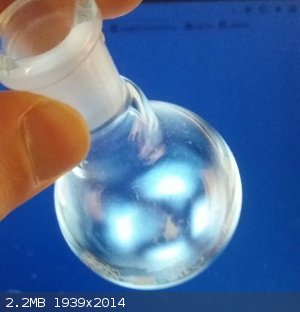LuckyWinner
Hazard to Others
  
Posts: 163
Registered: 27-8-2018
Member Is Offline
|
|
Quality Glassware breaking Easy by Cold Air! How to Avoid this?
This is one of the most annoying things that keep on happening to me.
I setup an experiment,
place my branded european made RBF 250ml
inside my aluminium heating block.
once the temperature reaches 77C, it breaks 2/3 up!
another time 500ml 3 neck RBF inside an oil bath!
temperature is at 60C.
overhead stirrer is inserted with stirrer guide into the middle neck.
its vibrating a bit but not violently.
BREAKS at its middle neck at 60C !
and so on....
I do all my stuff in a fumehood...
this happens with warm summer air 30C and cold winter air 10C.
why does this borosilicate glass break so easily?
I got this glass from one ebay supplier and broke
4x 250 RBF
1x500RBF
BRANDED european glass, exactly like this.
do I really always need to wrap everything tightly in aluminium and avoid
any thermal gradient, cold air that is blowing over the glassware?
nobody on youtube does that.
this is a serious safety hazard...
|
|
|
Antigua
Hazard to Others
  
Posts: 156
Registered: 27-9-2020
Member Is Offline
|
|
Are you sure this glass isn't fake, non-boro? It sounds very, very weird for it to crack at such mild temperatures. Maybe it had previous scratches or
cracks that you haven't noticed. You should try the same with an actuall, store-bought Simax or other brand flask and see the results.
|
|
|
LuckyWinner
Hazard to Others
  
Posts: 163
Registered: 27-8-2018
Member Is Offline
|
|
Quote: Originally posted by Antigua  | | Are you sure this glass isn't fake, non-boro? It sounds very, very weird for it to crack at such mild temperatures. Maybe it had previous scratches or
cracks that you haven't noticed. You should try the same with an actuall, store-bought Simax or other brand flask and see the results.
|
i thought that too...
but usually branded glassware does not break like this,
if cold wind blows on it?
high flowrate fumehood cold wind is a hazard to glassware???
[Edited on 31-10-2020 by LuckyWinner]
|
|
|
outer_limits
Hazard to Others
  
Posts: 139
Registered: 3-3-2020
Member Is Offline
Mood: hybridized
|
|
It seems that the quality is poor
It shouldn't be a problem
|
|
|
Herr Haber
International Hazard
    
Posts: 1236
Registered: 29-1-2016
Member Is Offline
Mood: No Mood
|
|
I sometimes worry when distilling things in the winter with the window open as I hear the hotplate struggling but never had anything like you
happening.
The spirit of adventure was upon me. Having nitric acid and copper, I had only to learn what the words 'act upon' meant. - Ira Remsen
|
|
|
Fyndium
International Hazard
    
Posts: 1192
Registered: 12-7-2020
Location: Not in USA
Member Is Offline
|
|
The glass is fraudulent. It either isn't boro or it's not properly annealed. Good quality boro can take quite a bit more abuse before it cracks.
Someone mentioned breaking glassware with aluminum heating block. I would think the thermal conductivity is so extreme it creates too large gradient
between glass outer and inner surfaces. It's pretty easy to heat the block to 200C, while the glass content can be at 56C when boiling acetone, for
example.
Please, if you will, post some pics of the glassware and state where did you order it from? I broke a fritted funnel bought from Nanshinglass when
drying it in oven at 100C and also my vacuum desiccator is inoperable currently because the vacuum outlet broke off. It appears to me that at least
some of their glassware is of substandard quality.
|
|
|
Ubya
International Hazard
    
Posts: 1247
Registered: 23-11-2017
Location: Rome-Italy
Member Is Offline
Mood: I'm a maddo scientisto!!!
|
|
before using any new piece of glassware i check for stress in the glass.
you can do the same using an LCD screen and a polaryzing filter.
white spots or rings on the glass are a sign of stress

another good reason could be the temperature difference between the heting block and the glass itself as other said already. Glass is not a good
thermal conductor, so if you are using heavy wall glassware and not gradually raising the temperature of the block different thermal expansions in the
glass could shatter it.
---------------------------------------------------------------------
feel free to correct my grammar, or any mistakes i make
---------------------------------------------------------------------
|
|
|
Fyndium
International Hazard
    
Posts: 1192
Registered: 12-7-2020
Location: Not in USA
Member Is Offline
|
|
The temperature elevation was reported something like 2C/min for thick walled reaction flasks. I've seen common amateurs just blast on a bunsen burner
flame directly below a flask, or a heating block. That creates a gradient from 20C to 900C in few seconds.
I use silicon oil or CaCl2 bath to heat all my stuff, for a very few selected exceptions. It has low conductivity compared to any metal or whatsoever,
and the thermal mass also raises the temp slow.
|
|
|
Syn the Sizer
National Hazard
   
Posts: 600
Registered: 12-11-2019
Location: Canada
Member Is Offline
|
|
Very strange, I live in Saskatchewan, Canada, this past evening Oct 31st it was -3oC and I did a phthalimide synth outside on a gas flame
with a decent breeze as will be seen in a future video I will be posting. I was using a cheap Chinese 500mL 3-neck RB flask from Ding Glassware, it
was totally fine.
|
|
|